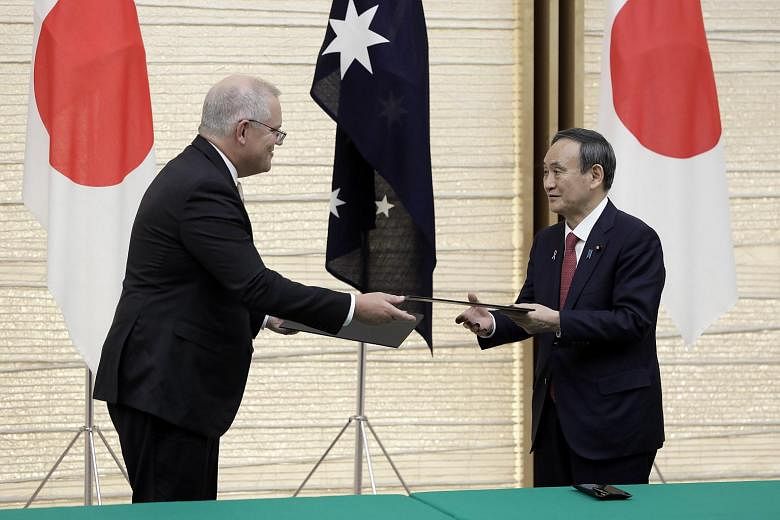TOKYO • Japan's Prime Minister Yoshihide Suga said yesterday that his country and Australia have reached a broad agreement on their bilateral defence pact to facilitate more joint operations and exercises on each other's soil.
The moves further strengthen defence ties between the two United States allies, at a time when China is asserting its role in the region and the US is going through a leadership transition.
The pact, called the Reciprocal Access Agreement, is a legal framework to allow their troops to visit each other's country and conduct training and joint operations.
Mr Suga made the comments during a joint news conference with Australian Prime Minister Scott Morrison, who is visiting Tokyo.
It will be Japan's first agreement covering foreign military presence on its territory since it signed a Status of Forces Agreement in 1960 that allowed the US to base warships, fighter jets and thousands of troops in and around Japan as part of a military alliance that Washington has described as the bedrock of regional security.
The countries have been negotiating the defence deal for six years, and that agreement still needs to be ratified by lawmakers.
The Suga-Morrison meeting came just weeks after foreign ministers of the Quad alliance, which also includes the US and India, met in the Japanese capital.
"A closer security arrangement is on the cards in Tokyo in a bid to mitigate the risks of a more adventurous China," said former intelligence officer John Blaxland, who is now a professor at the Australian National University, before the meeting between the two prime ministers.
"There is a clear overlap of interests when it comes to managing maritime security, but Australia will still be mindful it may be seen as leading attempts to gang up against Beijing," Professor Blaxland said.
Mr Morrison told reporters last week that he viewed the Quad as "very important".
The Chinese government will view the meeting with "cautious eyes and slight nervousness", said adjunct professor Yoshikazu Kato of the Asia Global Institute at the University of Hong Kong.
The renewed impetus of the Quad since 2017, when it was revived in an attempt to create a buffer against Beijing, is a symbol that democracies are willing to become "unprecedentedly united in their stance to contain China - it's of the utmost concern" to Beijing, he said.
In recent years, Australia has ramped up diplomatic lobbying to strengthen alliances with other democracies.
Still, Australia's move to take a leading role in the Quad, along with other multilateral groups like the Five Eyes intelligence sharing alliance, may lead to further punishment from Beijing that could exacerbate the country's reputation as China's new whipping boy.
While tensions had been growing for years, Australia tipped its relationship with its largest trading partner to a new nadir in April by leading international calls for independent investigators to enter Wuhan to probe the origin of the coronavirus.
REUTERS, BLOOMBERG

